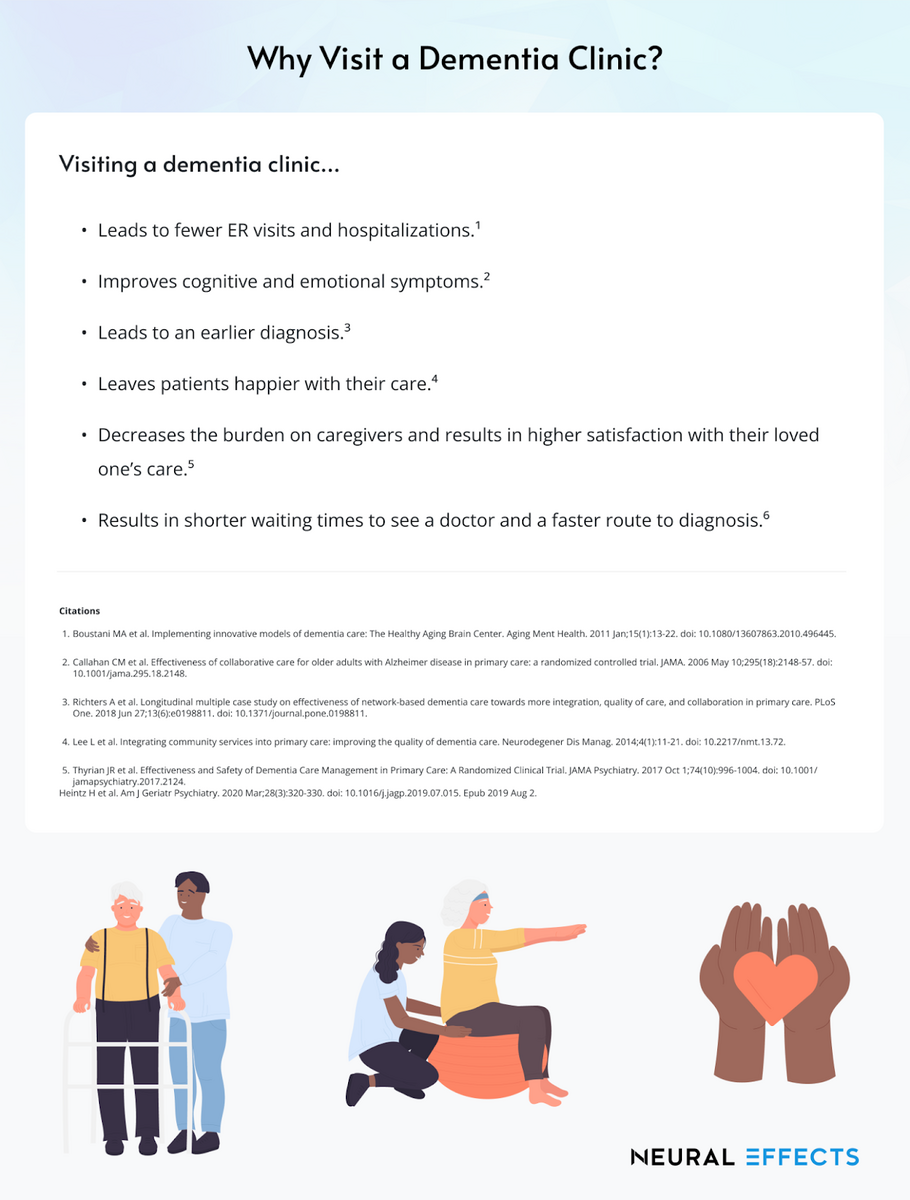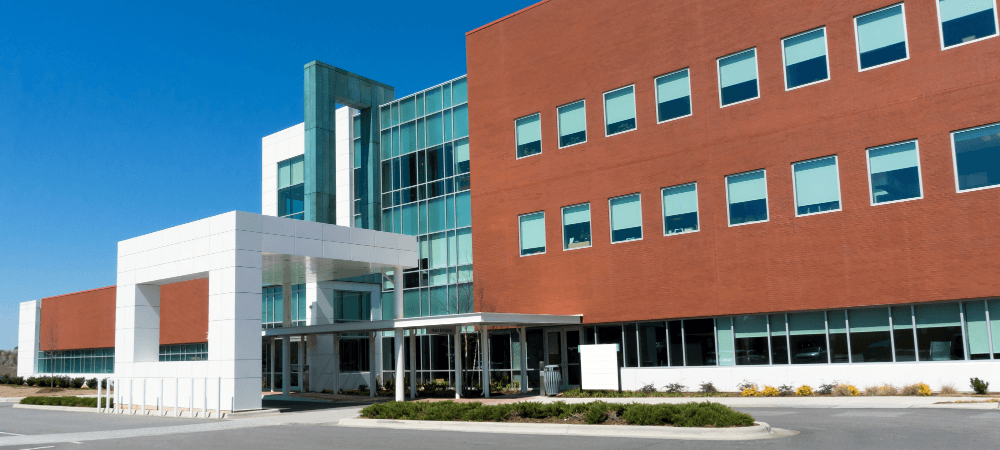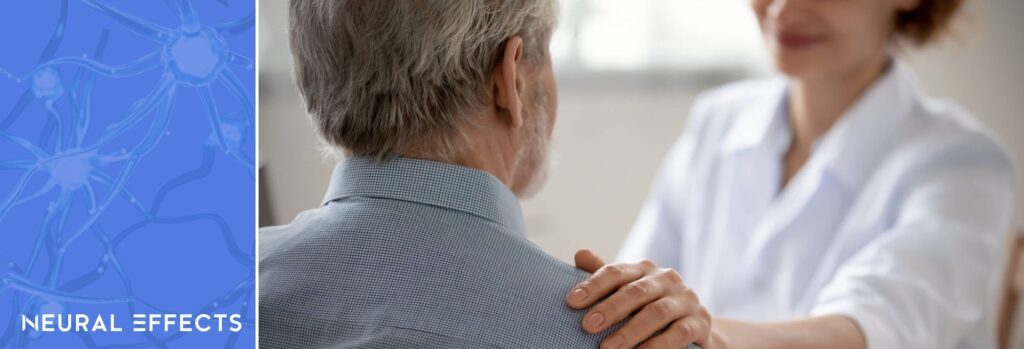Dementia is not just one disease. Instead, dementia is an umbrella term for several diseases that interfere with a person’s ability to maintain their daily activities because of the effect on memory, concentration, thinking, and other cognitive skills.
Although memory lapses are perhaps the most well-known symptom of dementia, especially Alzheimer’s disease, patients can suffer from a wide range of cognitive and physical symptoms. Plus, one patient may have multiple types of dementia.
For this reason, dementia care is rarely handled by one doctor. Assembling a care team can involve a frustrating number of appointments, waiting around for results and referrals, and more. It’s time-consuming for the patient, as well as for family members and care-takers who are trying to ensure they receive the medical care they need.
This makes dementia clinics like Neural Effects appealing because you can find more care under one roof and/or assistance coordinating care among dementia specialists. While we recommend visiting a good dementia clinic near you, sometimes that’s not an option.
In this article, we’ll describe the types of dementia specialists, what kind of care they offer, and how to choose good healthcare providers that suit the patient’s needs.
Neural Effects uses the latest evidence-based techniques to diagnose and help dementia patients. We are located in Provo, Utah and serve anyone in Salt Lake City or the Utah Valley area. We are in network for most types of medical insurance. Schedule your evaluation today.
Family Doctor (Primary Care Doctor)

Your family doctor is often a good starting point for general health concerns, and dementia is no exception. Primary care doctors are not specialized in any particular field of medicine but can diagnose and treat common medical conditions.
Ideally, you should always see the same doctor, but sometimes this may not be possible. When you visit your primary care physician about memory and thinking problems, make sure you ask how familiar they are with dementia and what kind of specialists they may refer you to. Some insurance companies may ask for a referral from a family doctor before you can visit a specialist.
Typically, family medicine doctors can:
- Conduct an initial assessment: If you visit your family doctor with concerns about your memory, they can perform a quick initial assessment. Typically, the doctor will ask questions about your medical history and what symptoms you’re experiencing, such as frequent memory lapses or struggling in conversations. Ideally, you should bring someone who knows you well to this appointment. They are in a perfect situation to describe to your family doctor signs that you may not even have noticed yet. They can also help you remember what was discussed at the appointment.
- Check for other conditions: Not all cognitive or memory problems mean you have dementia. Some conditions that cause similar symptoms include depression and anxiety, thyroid problems, and urinary infections. During this initial evaluation, your doctor may ask for specific tests to rule out these conditions, including blood and urine tests to check for liver, kidney, and thyroid function, as well as tests to measure hemoglobin A1c and vitamin B12.
- Assess cognitive skills: Your doctor may also conduct a few tests to assess your cognitive skills, such as memory, concentration, language, and thinking. Common tests for this purpose include the Montreal Cognitive Assessment (MoCA) and the Mini-Mental State Examination (MMSE). These tests can’t diagnose dementia, but they help identify any cognitive issues that warrant further investigation.
- Refer to a specialist: After this initial assessment, your doctor will most likely refer you to a specialist to confirm the diagnosis and determine the form of dementia, if possible.
- Offer ongoing support: Even after you’ve received a diagnosis of dementia and are receiving care from other doctors, it’s still advisable to maintain contact with your family doctor. This doctor will review your prescription medicines regularly and adjust as needed, as well as offer support to you and your family.
Doctors Who Specialize in Dementia Treatment

As described earlier, if your family doctor suspects dementia but can’t offer a definitive diagnosis, you will be referred to a dementia specialist for further examination. It’s likely that you may need to see more than one specialist.
The following are some of the specialists you may be referred to:
- Neurologists
- Geriatricians
- Geriatric psychiatrists and psychologists
These specialists can make a dementia diagnosis and may also be able to determine which type of dementia you have: Alzheimer’s dementia, Parkinson’s disease, Lewy body dementia, vascular dementia, frontotemporal dementia, or even some combination of these.
Neurologists
In general terms, neurologists treat disorders involving the nervous system, including problems with the brain, spinal cord, and peripheral nerves. Neurology school includes some training on how to treat dementia, but not all graduates have experience dealing with dementia patients. If you are referred to a neurologist, make sure they have a focus on Alzheimer’s or other dementias.
Most patients receive a dementia diagnosis from a neurologist. Usually, the process involves:
- Neurological tests to test balance, reflexes, and eye movement.
- Cognitive tests to assess cognitive skills, such as memory, reasoning, and language. If you want to find out more about these tests, we’ve described them in greater detail in another post about how dementia is diagnosed.
- Brain scans, including CT scans and MRIs, to confirm a dementia diagnosis or to rule out other possibilities, such as a stroke or brain tumor. Brain scans cannot be used to diagnose dementia in isolation. Patients may not show any obvious signs of dementia on the scan, but that doesn’t prove that they don’t have dementia.
Geriatricians
Geriatricians are trained to diagnose and treat diseases and conditions common among older adults (those over the age of 65). These doctors don’t just treat memory disorders and dementias but can handle other medical conditions, too. You may be referred to a geriatrician to determine if your symptoms are due to a condition other than (or as well as) dementia. They will perform the same tests described above.
Geriatricians also help older patients manage their medication. It’s common for these patients to need multiple meds, so it’s essential to have a doctor who can understand the side effects and drug interactions. In addition, geriatricians can assess the patient’s mobility and recommend strength and balance exercises as needed to increase safety and maintain independence. This is particularly relevant when patients are recovering after being in the hospital for a prolonged period. Older patients are at risk of complications going back home, and geriatricians can help with a smoother transition.
Geriatric Psychiatrists, Neuropsychologists, and Psychologists
Some psychiatrists, neuropsychologists, and psychologists pursue additional training in caring for older patients with mental health problems and/or dementia.
These doctors diagnose what’s causing memory loss or other cognitive issues, either due to dementia or mental health problems, such as anxiety and depression. For this diagnosis, they administer a variety of tests to assess cognitive skills, including memory, thinking, and language. They conduct a psychiatric evaluation to check the patient’s mood and sense of well-being.
For patients with early dementia, these doctors can offer counseling sessions to help patients adjust to their changing situation and cope with any mental health issues. As the disease progresses, these doctors treat dementia-related behaviors, such as aggression and agitation. Finally, they can offer referrals to other specialists and review the patient’s medication load.
Other Specialists Involved in the Treatment of Dementia Patients

There are many other specialists involved in the treatment of dementia patients who may be involved in a specific aspect of patient care, such as patient support, mobility, vision and hearing, cognitive function, oral health, nutrition, and sleep.
Patient Support
Nurses are trained to identify and meet dementia patients’ needs through planning short and long-term care, assessing home safety, and addressing the emotional needs of both patients and caregivers. These include:
- Community nurses, who have experience dealing with dementia and can help patients get dressed, eat on time, and take their medication. Usually, they get to know the patient well and can recognize signs of anxiety and distress if they arise.
- More specialized mental health nurses, who provide treatment, care, and support for people with mental health problems and dementia. Typically, they can visit patients at home, in a care facility, or in a hospital, and they advise patients and their families about ways to improve their quality of life. Often, this involves lifestyle changes, such as eating a healthy diet or engaging in regular exercise.
Mobility
Patients with dementia often need support to stay physically active or advice regarding special equipment needed at home. The following professionals can help with mobility issues:
- Occupational therapists can advise patients on how to complete activities of daily living (ADLs) independently for as long as possible. Usually, this includes helping the patient modify their routines, acquire assistive devices, and determine what level of extra care they need. In addition, they can provide emotional support and information about available support groups. For more information, see our post on occupational therapy for dementia.
- Physical therapists (also called physiotherapists) can help patients to deal with mobility issues and stay active. The aim is to encourage physical activity and independence for as long as possible. For more information, see our posts on physical therapy for dementia and a guide to 25+ physical therapy exercises for dementia patients.
- Chiropodists (also known as podiatrists) are trained to look after people’s feet and advise them on proper foot care. Patients with dementia are prone to loss of sensitivity and padding in their feet, and they can also suffer from collapsed arches and poor circulation. Good foot care can keep these issues under control and reduce the risk of falls.
Vision and Hearing
Dementia patients may need help with their eyes and ears. Problems with sight make patients more confused and increase the risk of injuries. The following professionals can help:
- Optometrists and opticians offer routine checkups, prescribe lenses, and handle basic eye care needs. It’s important to have the patient’s eyesight checked regularly by an optometrist or an optician. Ideally, it is best to find an optometrist with experience in dealing with patients with dementia who may need a caring and supportive approach, as even routine eye tests can become difficult and confusing.
- Ophthalmologists can diagnose and treat problems with the eyes. They’re more specialized than optometrists and can perform surgery if needed.
- Audiologists identify problems with hearing and fit a hearing aid if needed. Poor hearing can leave patients isolated and confused. If the patient is likely to forget to charge their hearing aids, you may need to discuss plans for how to help them use the aids consistently.
Cognitive Function
One of the main aims when treating dementia patients is to slow down cognitive impairment. Some of the therapists who can help include the following:
- Cognitive therapists use a variety of activities, such as word and number games, puzzles, discussion of current affairs, and practical activities, such as cooking or gardening, to slow down the patient’s cognitive decline and maintain quality of life. The aim is to improve memory, thinking, language, executive functions, concentration, and mood. You can learn more in our post about memory therapy for dementia.
- Speech and language therapists help dementia patients with problems related to communication and language, processing information, voice, speech, and swallowing difficulties. Therapists can also offer access to support groups, advice, and education for patients and caregivers.
- Music and art therapists use music and art to help dementia patients engage in brain-challenging activities, such as painting, dancing, or singing. These activities also help with symptoms of anxiety or restlessness.
Oral Health, Nutrition, and Sleep
The following healthcare professionals can help patients look after their teeth and mouth, diet, and sleep.
- Dentists and dental hygienists guide and support dementia patients on how to keep teeth healthy and prevent decay and gum disease. Ideally, patients should get advice as soon as possible after diagnosis and plan for the time when they will be unable to look after their own teeth. Patients should maintain regular check-ups and make sure dentures are comfortable.
- Nutritionists can advise patients about what to eat. Following a balanced diet is very important, especially if patients are experiencing poor appetite and weight loss. Not eating a balanced diet can cause dehydration, constipation, and urinary tract infections (UTIs), which aggravate symptoms of dementia. A nutritionist can suggest ways to overcome any food issues, such as making smoothies if patients struggle to swallow or using low-calorie sweets for patients with a sweet tooth.
- Sleep specialists can advise patients about healthy sleep patterns, including going to bed at the same time every day and avoiding the use of mobile phones before going to bed. If needed, these specialists can treat sleep disturbances with therapy or prescription drugs. Sleep medication is only advised as a last resort and only for a short period because it increases the risk of falls and causes mental confusion.
Dementia Clinics

Dementia clinics (sometimes referred to as memory clinics) are places where patients can get a more holistic approach to their treatment instead of visiting different specialists in different medical centers.
The aim is to bring some of the specialists described above together and offer dementia patients easier access to treatment. In some cases, different doctors are physically in the same clinic, while in others, doctors collaborate closely even though their offices are in different locations.
If it involves a multidisciplinary approach with multiple specialists, this collaborative model benefits patients and their caregivers. Visiting a dementia clinic:
- Results in fewer ER visits and hospitalizations
- Improves cognitive and emotional symptoms
- Leads to an earlier diagnosis
- Leaves patients happier with their care
- Results in shorter waiting times to see a doctor
- Decreases the burden put on caregivers
- Increases caregivers’ and family members’ satisfaction with the medical care offered to their loved one
Not all dementia clinics offer the same type of treatment options. Some focus more on short-term treatments, such as medication and supplements, while others follow the patients throughout their disease, offering treatment tailored to their abilities as their conditions change. Ideally, someone at your clinic can develop a comprehensive treatment plan that your physicians and therapists work together to follow.
Dementia Treatment at Neural Effects
[media library: physical-therapist-working-with-elderly-woman]
At Neural Effects, our team of dementia specialists has years of experience helping dementia patients and individuals with mild cognitive impairment. During treatment, we use a combination of cognitive stimulation therapy (CST) and exercise to delay cognitive decline and improve the patient’s quality of life. Multiple studies show that CST can protect cognitive function by itself, but we take it one step further by adding short sessions of aerobic exercise. This increases the benefit thanks to a mechanism in the brain whereby exercise stimulates the release of important neurochemicals which make the brain more receptive to therapy. One of these chemicals is called brain-derived neurotrophic factor (BDNF), which stimulates learning and memory.
Before treatment starts, patients undergo a neuropsychological exam (also called a neurocognitive evaluation) to find out how dementia has affected their brains. This exam takes about 2-2.5 hours to complete. Our therapists assess:
- Cognitive skills, such as problem-solving ability, memory, attention, and concentration
- Physical abilities, such as reflexes, eye movements, and balance
- Emotional signs of anxiety, stress, and depression
Once this exam is completed, all the information is combined to generate a cognitive care plan (CCP). All patients who are assessed by our team receive their CCP, even if they decide not to continue with treatment. The report still contains valuable information to help patients protect their cognitive function and improve their quality of life.
The CCP includes:
- Results from the assessment
- Risk factors and how the disease is likely to progress
- Lifestyle changes that may help the patient
- Ways the family can get involved
- Recommended treatment options
Patients who would benefit from CST attend 14 sessions of one-hour-long group therapy sessions. These sessions run twice a week for seven weeks. Sessions typically start with a few minutes of aerobic exercise done on a stationary bike or treadmill. The level of exercise is adjusted to what patients can do safely. Our therapists are trained to accommodate mobility issues and other health conditions that might affect exercise.
After exercise, patients then engage in their CST session. Each session is different, and patients may discuss current affairs, play board games, listen to music, or do arts and crafts. Overall, CST helps with cognitive skills, such as memory, thinking, and language. It boosts confidence and improves quality of life. (Not in the Utah Valley area? Find cognitive stimulation therapy near you.)
If our therapists or nurses feel that patients may benefit from additional therapy, we refer them as needed to the appropriate specialists.
We also feel it’s important to support our patients’ loved ones. Family members and caretakers are invited to attend the first session to learn more about CST. This way, they can help patients repeat some of the activities and games at home. Our therapists give family members additional information regarding local resources and lifestyle changes that can help their loved ones maintain independence for longer.
Neural Effects uses the latest evidence-based techniques to diagnose and help dementia patients. We are located in Provo, Utah and serve anyone in Salt Lake City or the Utah Valley area. We are in network for most types of medical insurance. Schedule your evaluation today.
How to Find the Right Dementia Specialists

Finding the right specialist for you is not always easy. This process requires care, research, and consideration. Below are some of the steps you can take to find the right dementia specialists for your family.
Step 1: Take Your Time Searching for the Right Specialist
A few ways to search for the right specialist include:
- Ask for recommendations: Talk to your friends or family who also had to find specialists for a loved one. You can also ask your family doctor for a recommendation.
- Search online directories: There are multiple online directories (which we list in the section below), but keep in mind that some only require a fee for the doctor to be listed. Don’t assume that they’re the right specialist for you just because they’re included.
- Look for subspecialties: This can be extremely valuable for dementia patients. For example, patients may need a geriatric psychiatrist rather than a general psychiatrist. These doctors have more specific knowledge in their area and may be more helpful than generalists.
Step 2: Screen Possible Specialists
Once you’ve identified a possible doctor (or doctors), you need to ensure they’re the right fit for you. Some important items to consider include:
- Insurance: Check with your insurance company before signing up with a doctor, and find out what treatments your insurance covers.
- Areas of expertise: Pick a specialist with the right qualifications and experience in treating dementia patients. For example, you’re likely to get your diagnosis from a neurologist, but not all neurologists specialize in dementia patients.
- Years of experience: Ideally, you need a doctor with some years of experience treating dementia.
- Location and opening times: Consider whether their location and opening times suit your needs. Do they offer video visits?
Step 3: Go for an Initial Consultation
Finally, you should book an initial consultation to see if you like the doctor’s manner and style. You need a specialist you can trust — a doctor who treats you with respect and listens to your concerns. Prepare a list of questions for the doctor, and bring current medications and your medical history to the consultation.
It’s important to note that even after you commit to a doctor, it’s perfectly acceptable either to seek a second opinion or to switch entirely to a different provider if your needs change. Make sure you have a new doctor before terminating your relationship with the first one.
Find Dementia Specialists Near You

Below, you can find a selection of websites that allow you to look for nearby specialists involved in the treatment of dementia patients. Most of these sites only list dementia doctors, nurse practitioners, and therapists who are accepting new patients. From Brooklyn, New York to San Francisco, California and everywhere in between, these doctor lists have dementia care providers near you.
Neurologists
Geriatricians
Psychiatrists, Psychologists, and Neuropsychologists
- US News (Geriatric psychiatrists)
- MediFind (Psychiatrists)
- American Psychiatric Association (Psychiatrists, psychologists)
- Psychology Today (Psychiatrists, Psychologists, therapists/counselors)
- American Society of Clinical Psychopharmacology (Psychopharmacologists)
Other Specialists
- Health Grades (Occupational therapy and physical therapy, sleep medicine)
- Vitals (Sleep medicine, physical therapy)
- US News (Sleep medicine, geriatric nurses)
- American Speech-Language-Hearing Association (Audiologists and speech & language pathologists)
Neural Effects uses the latest evidence-based techniques to diagnose and help dementia patients. We are located in Provo, Utah and serve anyone in Salt Lake City or the Utah Valley area. We are in network for most types of medical insurance. Schedule your evaluation today.
